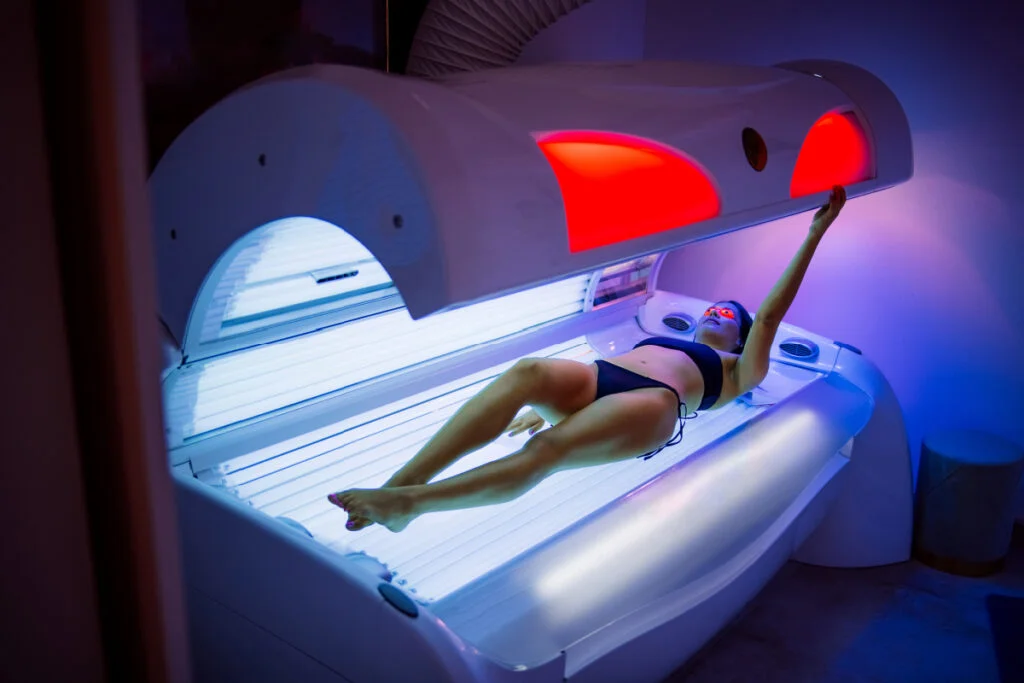Can a tanning bed help improve certain skin concerns?

The topic of using a tanning bed to help with psoriasis, eczema, or other concerns related to skin health has garnered attention on social media, with mixed messages about its benefits and health risks. If you are looking to learn the facts, you’re in the right place!
It’s understandable to seek relief from persistent skin conditions, but tanning beds are not a safe solution. Here, our dermatology professionals explain why you should never use a tanning bed, plus available alternatives.
It’s a myth that tanning—from the sun or tanning beds—improves your skin health. In fact, UV exposure causes skin cancer and aging.
The risks of tanning beds outweigh the benefits
Tanning beds emit UV radiation, similar to sunlight, which can give skin a tanned look. While sunlight contains both UVB (B = burn) and UVA (A = aging) rays, tanning beds usually only contain UVA rays.
Some people with skin conditions like psoriasis may notice temporary relief from their symptoms after tanning. In fact, professional phototherapy treatments for psoriasis use UV rays—UVB, as well as UVA with a sensitizing medication—to treat psoriasis flares. Still, despite the potential relief, tanning beds are considered unsafe by health professionals and are strongly discouraged, including as a treatment for psoriasis, for several reasons:
- Increased risk of skin cancer: According to a meta-analysis of numerous studies, using tanning beds significantly increases your risk of developing all skin cancers. Notably, people who started using tanning beds before the age of 35 were found to have a 75% higher chance of developing melanoma—the deadliest form of skin cancer.
- Premature aging: UV radiation from tanning beds can lead to premature skin aging, including wrinkles, leathery or crepe-like skin texture, and age spots.
- Risk of eye damage: Exposure to UV radiation can harm the eyes, leading to conditions like cataracts.
Prescription phototherapy with UVB or PUVA rays are highly controlled and precise, so neither sunlight nor tanning beds should be self-administered to replace them. Further, other treatment options—sometimes more than one—should be considered.
Tanning beds are also less effective than these options, simply because they contain UVA rays. Phototherapy typically uses either controlled UVB, or UVA paired with photo-sensitizing medication that is required to achieve the therapeutic effects.
Professional dermatology care for psoriasis
We encourage you to consult with a dermatology provider who can diagnose your skin concerns and work with you to offer personalized treatment options from the effective and safe options available. Effective and safe dermatology treatments for psoriasis are available and should be prescribed by a dermatology physician assistant or a dermatologist. According to the National Psoriasis Foundation, these may include:
- Topical medications
- Phototherapy, or light therapy
- Systemics (including biologics and oral treatments)
- Complementary and integrative health modifications
Our dermatology office also offers treatments for other concerns, and we are happy to work with you to perform your annual skin checks and to develop a treatment plan if you are experiencing eczema, acne, rosacea, or a flare-up that is thus far undiagnosed.

Self-tanning as a tanning bed alternative
For those seeking a bronzed glow without the risks of a tanning bed, self-tanning products offer a safer, yet effective, alternative. These products come in various forms, such as lotions, sprays, and mousses, and contain ingredients like dihydroxyacetone (DHA) that react with the skin to create a tan appearance without UV exposure. Modern self-tanners are designed to provide an even, streak-free tan, avoiding the uneven results they have been associated with. Just be sure to follow the instructions and exfoliate your skin before application!
At Berks Plastic Surgery’s dermatology clinic, we prioritize your health and well-being above all. If you are looking for trusted aesthetic skin treatments or cosmetic injectables, our Reading dermatology team has many years of experience and is happy to work with you to help you reach your goals! Call 610-320-0200 or book online to get started today.
“I am a dermatology patient. What a wonderful environment. The entire staff is warm and friendly, the care is thorough and professional and the offices are beautiful. I drove from Lancaster because I have heard wonderful things and I am glad I did! This will be my regular dermatology office moving forward and I urge others to do the same.”
5-Star Google Review
